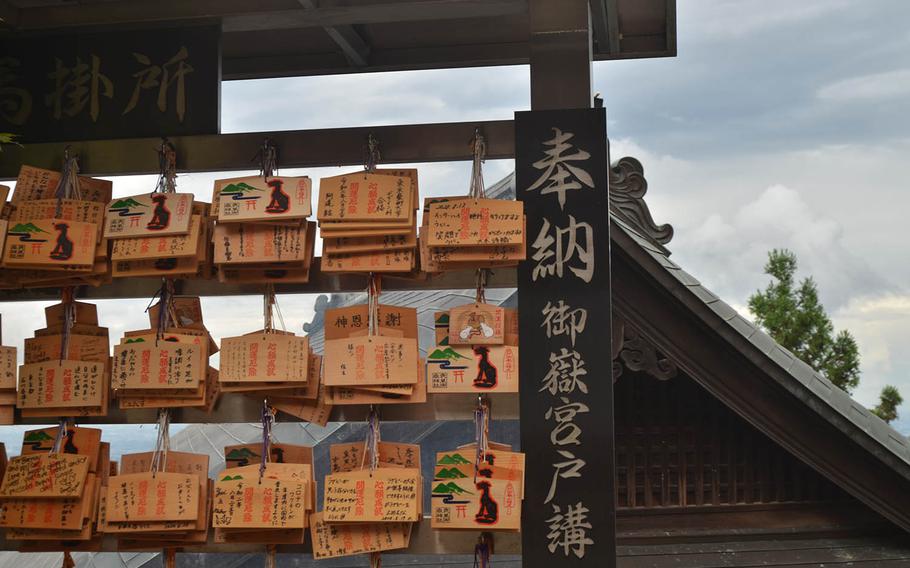
A common New Year's tradition in Japan is to purchase talisman called omamor, to welcome success and happiness in the new year. (Erica Earl/Stars and Stripes)
Stars and Stripes is making stories on the coronavirus pandemic available free of charge. See other free reports here. Sign up for our daily coronavirus newsletter here. Please support our journalism with a subscription.
New Year’s Eve festivities will look a bit different in Japan this year thanks to the coronavirus pandemic, which is setting record case numbers in places like Tokyo.
The Japanese government discourages large gatherings in crowded clubs and U.S. military restrictions in Japan put some party-centric areas and behaviors out of bounds, anyway.
But tradition provides plenty of socially distanced options for bidding goodbye to troublesome 2020 beyond watching TV at home alone.
Here are some ways to ring in the Year of the Ox in Japan safely:
Visit a shrineIt is customary in Japan to visit a shrine or temple at midnight on New Year’s Eve or during New Year’s Day, according to the Japan National Tourism Organization.
Many people go with their families to pay respects to the gods for getting them through the year safely and pray for health, financial stability, love and strong family bonds in the new year, the website says.
Traditions include visiting a local Buddhist temple to ring its bell on midnight as a farewell to human pain and suffering from the previous year. Keep in mind social distancing if you do decide to queue up for this.
You can also visit a nearby Shinto shrine to buy charms and talisman, called omamori, to welcome success and happiness into 2021.
There are plenty of shrines to choose from, with about 80,000 in the country, according to the Japan Association of Shinto Shrines website.
Go Lucky Bag shoppingLucky Bags, or fukubukoro, are another New Year’s tradition unique to Japan, according to The Japan Times.
The first of the year is a major shopping event in Japan, much like America’s Black Friday, and a time to purchase signature “lucky bags.”
Stores of all kinds, including toy shops, clothing stores and electronic shops, offer a bundle of specialty and surprise items for purchase inside colorful packages.
Some retailers offer a hint of what’s inside; at others the contents are a complete surprise.
Lucky bags are sold on a first-come-first-serve basis, so get to the mall early.
This year, to avoid crowds, some stores are offering lucky bags over several days or allow you to hold your place online. Look up your local mall or the shop you most want fukubukoro from to check the dates and availability.
Have a self-pampering nightSay goodbye to a stressful year by bringing the spa to your own home.
Japanese beauty shops sell myriad locally made and Korean self-care products such as face masks, soaps, lotions and hair oils.
Favorite pampering items are Korean sheet masks, varieties of which include snail jelly, green tea, ceramide and gold flecks.
See the first sunriseThis is another common tradition in Japan, according to the Japan National Tourism Organization.
Dress in warm layers, grab a hiking companion and take a walk to see the first sunrise of the new year from destinations such as Mount Mitake and Mount Takao, west of Tokyo, or Mount Mitsutoge, near Mount Fuji.
Avoid hiking in the dark without a headlamp. If you don’t have one, enjoy the sunrise from the base or parking lot, then head up the trail to see the glow of dawn of 2021 wash over the landscape. This is a refreshing way to start the new year and is a great kick-start if fitness is a new year’s resolution.
Be sure to research weather and trail conditions before setting off.
Watch a traditional Japanese TV specialFor those who genuinely do want to send the holiday cozied up on the couch watching TV, consider immersing yourself in a Japanese tradition if you have local cable access by tuning in to “Kouhaku Uta Gassen,” a special that has been running on the Japanese broadcast network NHK since 1959, according to the broadcaster’s website.
The program is scheduled to air from 7:15 p.m. to 11:45 p.m. Thursday and features musical battles between popular musicians and recording artists.
earl.erica@stripes.com Twitter: @ThisEarlGirl